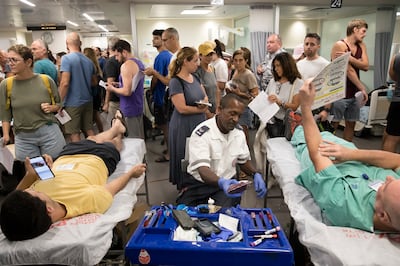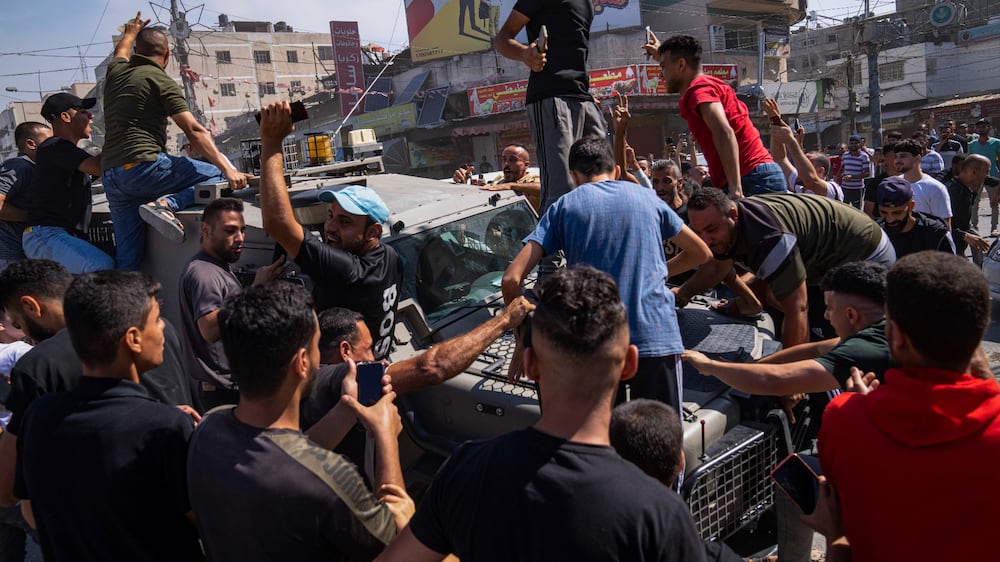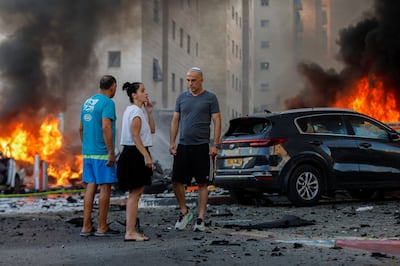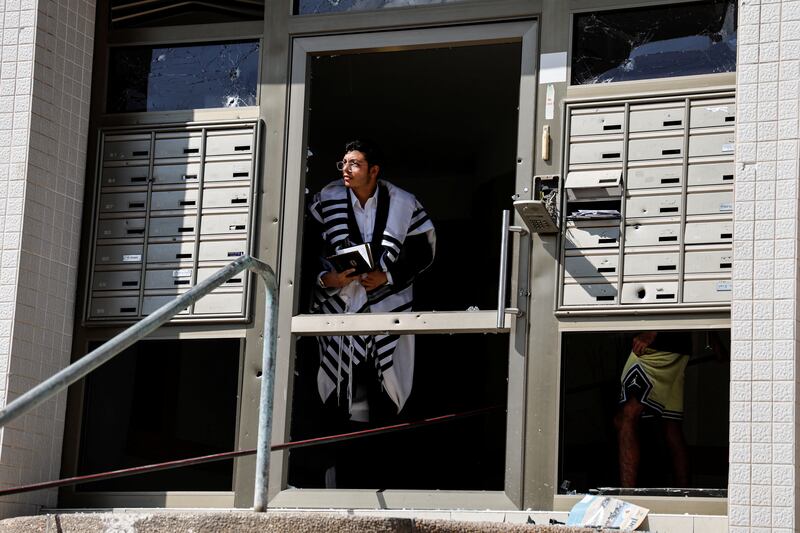Talking to Israelis from their bomb shelters, basements and cars as they seek safety is, for now, the best way to comprehend the scale of attacks on the country on Saturday.
“I have friends hiding in their basements on the border with their kids like the Holocaust,” Josh from Tel Aviv told The National.
“Watching this makes me sick to my stomach."
He said there were reports of people, including women and children, being kidnapped and taken to Gaza.
“I have friends who have been hiding in their basement for six hours as terrorists knock on doors of their kibbutz," he said.
The ruling Hamas militant group in the Gaza Strip carried out an unprecedented attack on Israel at daybreak on Saturday, firing thousands of rockets as dozens of fighters infiltrated the heavily fortified border, catching the country off guard on a major holiday.
Israeli Prime Minister Benjamin Netanyahu declared the country was “at war” and called for a mass mobilisation of army reserves.
Israel's ambulance service said at least 40 Israelis were killed and hundreds wounded in the Hamas attack but the total appeared likely to rise, making it the deadliest attack in Israel in years.
The Palestinian Health Ministry confirmed at least 198 were killed so far while 1,610 were wounded by Saturday afternoon in Gaza following Israeli retaliation on the Palestinian territory.
Terry, also from Tel Aviv, recounted the terrifying moment he rushed his children to a bomb shelter.
“We’re in the Jewish festival of Sukkot. We were sleeping in our Sukkah [a temporary hut constructed for use during the week-long holiday] yesterday with our kids, in our garden,” he told The National.
"We were woken up at 6.30 by the sirens. When you’re outside it was booming. It was pretty crazy to go running from there into the bomb shelter.
“They’ve taken the happiest day in the Jewish calendar and have tried to do the worst possible thing that they could do. This is just the beginning. It’s going to get considerably worse.”

Terry claimed children had been kidnapped during the violence.
"Israeli kids are currently in Gaza. I’ve tried to keep my children away from this. I don’t want them to have PTSD," he said.
“It is the scariest possible thing you can imagine: masked, gunmen terrorists breaking into your house early in the morning.
"It’s one thing having missiles, but breaking into your most personal space in the world and taking you away is something else."
He said he had not yet made contact with about his half of his family. “They live in Ashdod. All my nephews have been called up for reserve duty," he said.
Ari said he had to physically throw children into a bomb shelter, as a rocket slammed into the ground a couple of hundred metres from his Tel Aviv home.
“I was the last one in. There were kids streaming in and I was throwing them down," he said.
"Just before I got down, we heard a massive boom. I looked behind and there was smoke billowing out.”
What is happening with Israel and Gaza?

The overwhelming sense among people right now is one of national solidarity, and particular horror that Israeli hostages, military and civilian, now appear to be held by Hamas in Gaza.
“I will absolutely not leave here. It’s an honour to protect yourself,” Terry said.
The former head of Israel’s National Security Council Giora Eiland told The National he does not think the authorities "will try to do something specifically today in regards to these people”, referring to the Israeli hostages.
“I think this will happen in the second phase once we push back the Hamas fighters to Gaza. But one of the main goals will be to bring them back, hopefully alive. I don’t think we’ll stop the operation until we have them.”
Despite Israeli unity in the face of these events, something rare in recent months as the country reels from mass protests against the new government’s controversial judicial reform, questions are already being asked about how such a disaster was allowed to happen, in a country that invests so much on deterrence.

“The magnitude of this intelligence failure will need some serious inquiry but in the meantime we have to get control of our borders, which are still open, and for the first time since 1948, recapture Israeli communities,” Josh said.
Terry called for “maximum force” from Israel, which he said should mete out a “horrendous price for other enemies thinking of jumping on the bandwagon”.
“Deterrence is the best way of keeping some sort of peace here,” he said.
“If we don’t have deterrence, like we saw in Lebanon in 2006 where it’s been quiet ever since, there will be a lot more lives lost. This will be a stronger response than 2006.”
He also called for international solitary, something he was not too confident Israel would receive in the weeks ahead.
“I expect that within three to five days lots of outlets will start accusing Israel of war crimes, as innocent civilians get killed as part of the chase of the Hamas leadership, with their cynical use of human shields," Terry said.
“We have to get back all of the people who’ve been kidnapped alive. If it’s only bodies we need them back as well.
“Every generation has its challenges. I’m very glad we have an army to protect us. Seventy-five years ago there was no army to do so.
“We could only call out to the world and the world was silent. I call out to the free world: we are on the front line, we are on the border with terrorists.
“This is not like the US where there’s some narcotics people on the border. We are literally less than a kilometre away from terrorists.
“When we respond we need you to be with us.”







